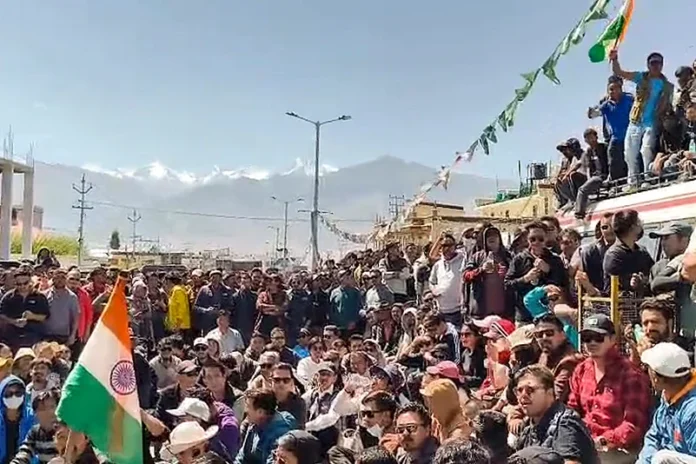Leh has been thrust into the spotlight after a wave of protests escalated into unrest, leaving behind casualties, arrests, and a heavy security clampdown. Following the deaths reported during the agitation, authorities have initiated a sweeping crackdown, detaining at least 50 individuals, including political activists and local leaders. Among those booked is a Congress councillor, signaling the seriousness with which the administration is responding to the unrest.
The protests, rooted in long-simmering grievances, drew large crowds from local communities demanding redress on issues ranging from political representation to resource management and employment. Tensions flared when demonstrators clashed with police, leading to chaos that tragically resulted in fatalities. The loss of life has only deepened public anger but has also prompted the administration to justify its crackdown as a measure to restore order.
The detention of 50 individuals is being seen as both a preventive step and a message of zero tolerance toward violent demonstrations. Police officials claim that those picked up played active roles in inciting the protests or obstructing law enforcement during clashes. Human rights groups and opposition parties, however, have criticized the move as heavy-handed, warning that mass detentions could inflame rather than calm the situation.
The booking of a Congress councillor has added a sharp political edge to the crisis. Local Congress leaders have condemned the charges, describing them as an attempt to silence dissent and criminalize political opposition. The ruling administration, on the other hand, argues that political affiliation cannot shield anyone accused of instigating violence or spreading misinformation.
The region of Leh, known for its sensitive strategic location and fragile ecology, has witnessed growing civic unrest in recent years. Demands for greater safeguards for local identity, land rights, and political autonomy have often surfaced in public debates and agitations. The recent protests have once again highlighted the delicate balance between governance, development, and local aspirations in the Union Territory.
Security has been tightened across Leh, with additional forces deployed to prevent further escalation. Internet restrictions, checkpoints, and close surveillance of political gatherings are now in place. Authorities maintain that these are temporary measures to prevent misinformation and ensure peace, but civil society voices argue that curbs on communication and political activity only deepen mistrust.
Analysts suggest that the crackdown reflects a broader pattern of the government’s approach in conflict-prone or politically sensitive regions—prioritizing security and law enforcement over dialogue. While this may provide short-term stability, experts warn it risks alienating the local population, particularly the youth, who are already feeling disconnected from mainstream political processes.
The deaths during the protests remain a focal point of public emotion. Demands for an impartial judicial inquiry have been growing, with local leaders and national parties calling for accountability from both police and administrative officials. Without a transparent investigation, critics fear the cycle of mistrust and confrontation will only persist.
As the situation develops, the government faces a dual challenge: maintaining peace on the ground while also addressing the root causes of discontent. For the people of Leh, the immediate question is not only about justice for those detained or killed but also about whether their concerns will be heard beyond the lens of law-and-order enforcement.



